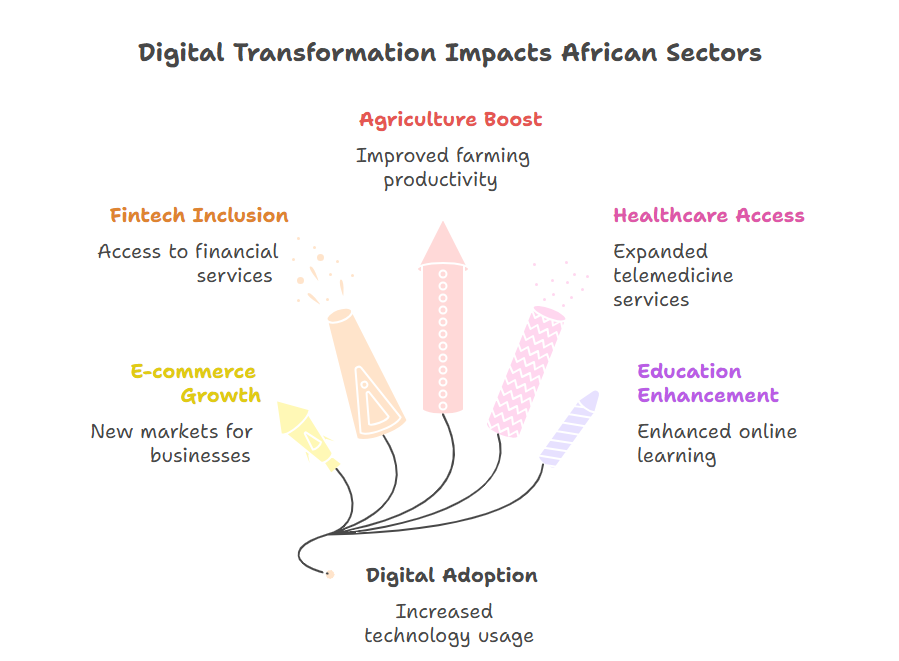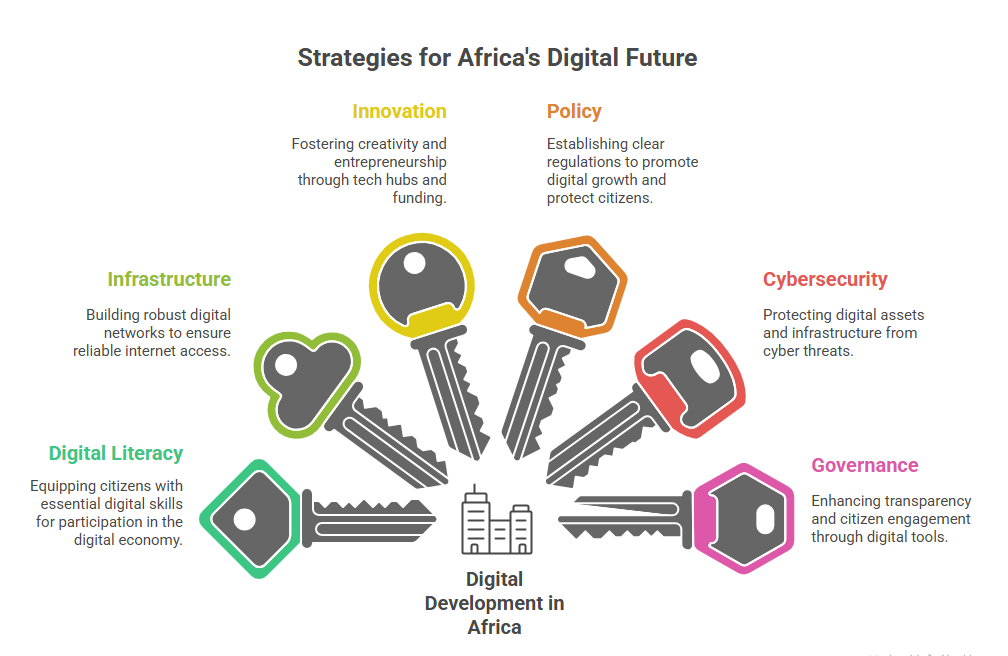This blog post explores the immense potential of digital growth for Africa and provides actionable strategies for the continent’s next generation of leaders to harness technology for sustainable development and economic prosperity. It emphasizes the importance of digital literacy, infrastructure development, innovation, and policy frameworks in driving transformative change across various sectors.
Introduction: Africa’s Digital Frontier
Africa stands at the cusp of a digital revolution. With a young and rapidly growing population, increasing mobile penetration, and a burgeoning tech ecosystem, the continent is poised to leapfrog traditional development models and embrace a digital-first future. However, realizing this potential requires visionary leadership, strategic investments, and a commitment to inclusive growth. This post outlines actionable strategies for Africa’s next leaders to drive digital growth and unlock the continent’s vast potential.
The Untapped Potential of Digital in Africa
The digital landscape in Africa presents a wealth of opportunities across various sectors:
- E-commerce: The rise of e-commerce platforms is transforming retail, creating new markets for local businesses and providing consumers with access to a wider range of goods and services.
- Fintech: Mobile money and digital payment solutions are revolutionizing financial inclusion, enabling millions of unbanked Africans to access financial services.
- Agriculture: Digital technologies are improving agricultural productivity through precision farming, market information systems, and supply chain optimization.
- Healthcare: Telemedicine and digital health solutions are expanding access to healthcare services, particularly in remote and underserved areas.
- Education: Online learning platforms and digital educational resources are enhancing access to quality education and skills development.

Actionable Strategies for Africa’s Next Leaders
To effectively harness the power of digital for sustainable development, Africa’s next leaders must focus on the following key areas:
1. Investing in Digital Literacy and Skills Development
- Promote digital literacy programs: Implement nationwide initiatives to equip citizens with basic digital skills, including computer literacy, internet usage, and online safety.
- Integrate digital skills into education curricula: Revamp education systems to incorporate digital skills training at all levels, from primary school to higher education.
- Support vocational training programs: Offer specialized training programs in high-demand digital skills, such as software development, data analytics, and cybersecurity.
- Foster mentorship and apprenticeship opportunities: Connect young Africans with experienced professionals in the tech industry to provide guidance and practical training.
2. Building Robust Digital Infrastructure
- Expand broadband access: Invest in expanding broadband infrastructure, particularly in rural and underserved areas, to ensure affordable and reliable internet access for all.
- Promote public-private partnerships: Encourage collaboration between governments and private sector companies to accelerate infrastructure development and innovation.
- Invest in renewable energy: Power digital infrastructure with renewable energy sources to reduce carbon emissions and promote sustainable development.
- Develop data centers and cloud infrastructure: Establish local data centers and cloud infrastructure to improve data storage, processing, and security.
3. Fostering Innovation and Entrepreneurship
- Create innovation hubs and tech parks: Establish physical spaces where entrepreneurs, researchers, and investors can collaborate and develop innovative solutions.
- Provide funding and mentorship for startups: Offer seed funding, venture capital, and mentorship programs to support early-stage startups and help them scale their businesses.
- Promote open data initiatives: Make government data publicly available to encourage innovation and the development of data-driven solutions.
- Encourage collaboration between universities and industry: Foster partnerships between universities and industry to promote research and development and commercialize new technologies.
4. Developing Enabling Policy and Regulatory Frameworks
- Establish clear and transparent regulations: Develop clear and transparent regulations that promote competition, protect consumers, and encourage investment in the digital economy.
- Promote data privacy and security: Implement robust data privacy and security laws to protect citizens’ personal information and build trust in digital services.
- Support digital trade and cross-border data flows: Facilitate digital trade and cross-border data flows to enable African businesses to participate in the global digital economy.
- Encourage digital inclusion: Develop policies that promote digital inclusion for marginalized groups, such as women, people with disabilities, and rural communities.
5. Prioritizing Cybersecurity
- Develop national cybersecurity strategies: Create comprehensive national cybersecurity strategies to protect critical infrastructure and data from cyber threats.
- Invest in cybersecurity training and awareness: Provide cybersecurity training for government employees, businesses, and citizens to raise awareness of cyber risks and best practices.
- Establish national cybersecurity incident response teams: Create national cybersecurity incident response teams to quickly detect, respond to, and mitigate cyberattacks.
- Promote international cooperation on cybersecurity: Collaborate with international partners to share information and best practices on cybersecurity and combat cybercrime.
6. Promoting Digital Governance and Citizen Engagement
- Implement e-governance initiatives: Digitize government services to improve efficiency, transparency, and citizen engagement.
- Promote open government data and citizen participation: Make government data publicly available and encourage citizen participation in decision-making processes through online platforms.
- Use digital technologies to combat corruption: Leverage digital technologies to track government spending, monitor procurement processes, and detect corruption.
Ensure digital access for all citizens: Provide affordable internet access and digital literacy training to ensure that all citizens can participate in digital governance.

Conclusion: A Call to Action
Africa’s digital future is bright, but realizing its full potential requires bold leadership, strategic investments, and a commitment to inclusive growth. By focusing on digital literacy, infrastructure development, innovation, policy frameworks, cybersecurity, and digital governance, Africa’s next leaders can drive transformative change and unlock the continent’s vast potential. The time for action is now. Let us work together to build a digitally empowered Africa for the benefit of all its citizens.
Send Us An Email: info@valuegate.com.
Follow Us On LinkedIn Today.
Follow Us On Facebook Today.
Partner With Us to support youth-led initiatives across Africa.




